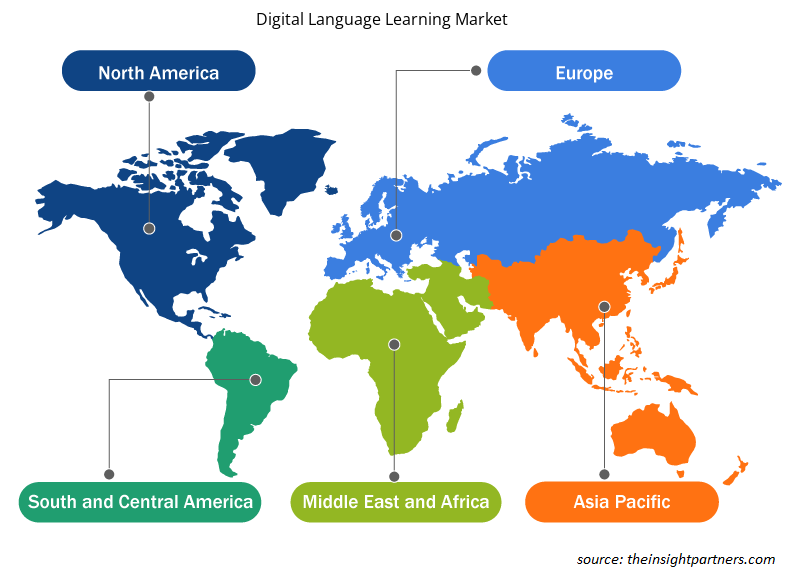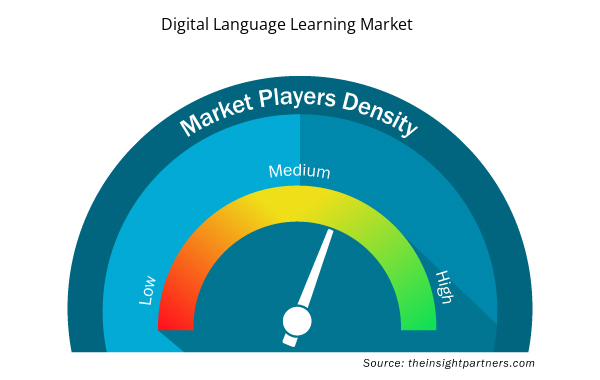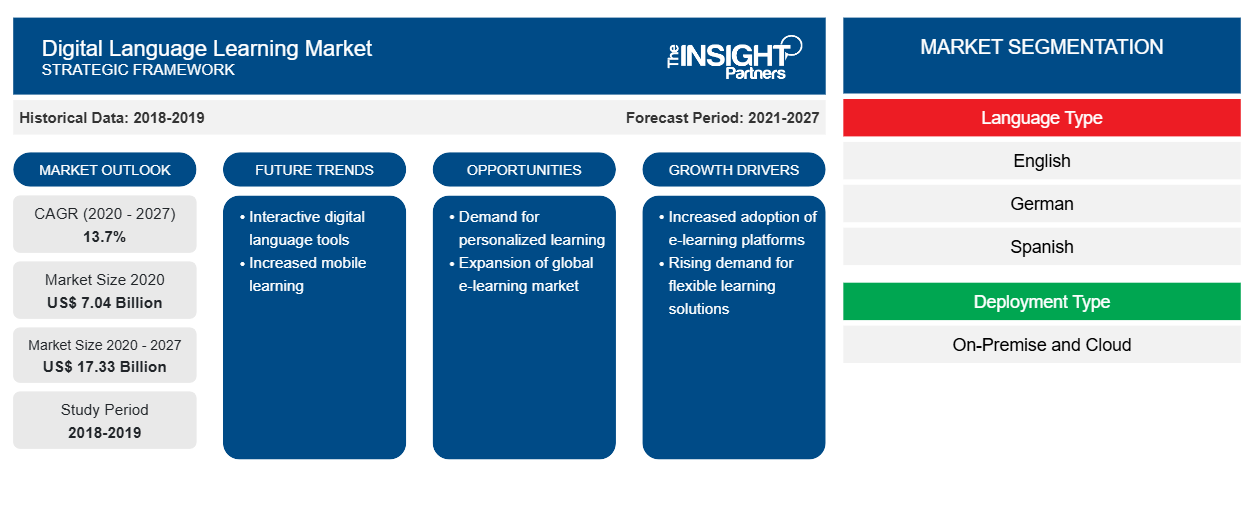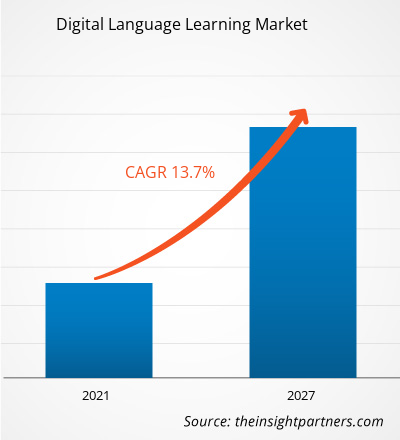من المتوقع أن ينمو سوق تعلم اللغة الرقمية من 7038.2 مليون دولار أمريكي في عام 2020 إلى 17333.4 مليون دولار أمريكي بحلول عام 2027؛ ومن المتوقع أن ينمو بمعدل نمو سنوي مركب نسبته 13.7٪ من عام 2020 إلى عام 2027.
إن المبادرات التي اتخذتها الحكومات المختلفة لتنفيذ برامج تعلم اللغة الإنجليزية تعزى إلى نمو السوق. يتحول قطاع التعليم العالمي بشكل كبير على خلفية المبادرات المختلفة التي اتخذتها الحكومات والمنظمات الخاصة لتقديم أداء معزز رقميًا. لقد بدأت حكومات دول مختلفة مثل الصين وأستراليا والبرازيل والإمارات العربية المتحدة في تنفيذ مخططات التعليم الرقمي في السنوات الماضية، مما ساعد هذه البلدان على تعزيز أنظمة التعليم باللغة الإنجليزية الخاصة بها. على سبيل المثال، مكنت ثورة التعليم الرقمي (DER) التي أطلقتها الحكومة الأسترالية، والتي بدأت قبل عقد من الزمان، العديد من المدارس والجامعات من الاستفادة من التعليم الرقمي. وبالمثل، بدأت الحكومة الصينية أيضًا في تنفيذ العديد من السياسات لدفع التعليم الرقمي مع التركيز بشكل رئيسي على تعلم اللغة الإنجليزية، مما دفع إلى زيادة عدد الشركات التي تقدم حلول التعلم الرقمي للطلاب الصينيين. 51Talk هي واحدة من أبرز مؤسسات تعلم اللغة الإنجليزية الرقمية في الصين؛ 17Zuoye هي منصة رقمية أخرى للطلاب والمعلمين وأولياء الأمور الصينيين، والتي توفر مهام عبر الإنترنت في شكل تمارين وواجبات منزلية، مما يسمح للمستخدمين النهائيين بتعزيز قدراتهم. حاليًا، تتجه الهند جاهدة لإنشاء سوق كبيرة للتعليم الرقمي. وقد اتخذت الحكومة الهندية مبادرات مختلفة لنشر تقنيات التحول الرقمي في القطاع التعليمي. تعد SWAYAM منصة التعلم الرقمي الأكثر بروزًا والمبادرة التي اتخذتها الحكومة الهندية، والتي تساعد الطلاب على اختيار الدورات التدريبية عبر الإنترنت، والتي تغطي جميع مواد التعليم العالي. كما يُسمح للجامعات الدولية بتقديم دوراتها وامتحاناتها الخاصة من خلال منصة SWAYAM، مما يسهل على الطلاب التعلم واختيار الامتحانات من الجامعات الدولية. يعزز هذا العامل مهارات تعلم اللغة الإنجليزية والتحدث والكتابة لدى الطلاب. المكتبة الرقمية الوطنية هي مبادرة أخرى نفذتها الحكومة الهندية بهدف تقديم مصدر افتراضي لموارد التعلم، من مرفق النافذة الواحدة. تكتسب هذه المبادرة أهمية تدريجية ومن المتوقع أن تعزز سوق تعلم اللغة الإنجليزية الرقمية في الهند لتنمو في السنوات القادمة، وبالتالي المساهمة في نمو سوق تعلم اللغة الرقمية العالمية
قم بتخصيص هذا التقرير ليناسب متطلباتك
ستحصل على تخصيص لأي تقرير - مجانًا - بما في ذلك أجزاء من هذا التقرير، أو تحليل على مستوى الدولة، وحزمة بيانات Excel، بالإضافة إلى الاستفادة من العروض والخصومات الرائعة للشركات الناشئة والجامعات
- احصل على أهم اتجاهات السوق الرئيسية لهذا التقرير.ستتضمن هذه العينة المجانية تحليلاً للبيانات، بدءًا من اتجاهات السوق وحتى التقديرات والتوقعات.
تأثير جائحة كوفيد-19 على سوق التعلم الرقمي للغات
لقد أحدث تفشي الوباء مؤخرًا اضطرابًا إيجابيًا كبيرًا في قطاع التعليم الحالي على مستوى العالم خلال الأشهر القليلة الماضية. وعلاوة على ذلك، شهد الاضطراب في المؤسسات التعليمية التقليدية وتقنيات التعلم القائمة على الفصول الدراسية زيادة في تبني حلول التعلم عبر الإنترنت والرقمية القوية والفعالة ومن المتوقع أن يستمر في دعم نمو السوق بعد الوباء في السنوات القادمة. على سبيل المثال، تعاونت اليونسكو مع العديد من الممثلين البارزين من شركات التكنولوجيا والاتحاد الدولي للاتصالات للتأكيد على الأهمية الاقتصادية لتبني التقنيات الرقمية في التعلم لتمكين قدرات التعلم السريع بين الجمهور الأكبر دون استثمار كبير في البنية التحتية المادية بين الاقتصادات الناشئة.
في حين أنه في دراسة استقصائية منفصلة أجرتها جامعة كامبريدج، حدد أكثر من 1200 مشارك ميلًا متزايدًا للاستمرار في استخدام تقنيات التعلم الرقمي بين 60٪ من المرشحين للاستطلاع في السنوات القادمة. وبالتالي، سهّل تفشي الوباء الأخير زيادة في تبني تقنيات التعلم الرقمي وبالتالي أثر بشكل إيجابي على نمو السوق في الأشهر القليلة الماضية
رؤى السوق - سوق التعلم الرقمي للغات
الاستفادة من التقنيات المتقدمة والمبسطة لجذب الطلاب نحو التعليم الرقمي
في البلدان المتقدمة، مثل الولايات المتحدة والمملكة المتحدة، اكتسب نظام التعليم الرقمي شعبية هائلة حيث أصبح الطلاب في المدارس والجامعات والمؤسسات الأخرى على دراية كاملة بالتقنيات. ومع ذلك، في بلدان منطقة آسيا والمحيط الهادئ وجنوب شرق آسيا، يفتقر الطلاب إلى الوعي بالتعلم القائم على التكنولوجيا. تنفذ العديد من المدارس والجامعات ومؤسسات التدريب التقنيات الرقمية في فصولها الدراسية. نظرًا لأن مطوري المنصات التعليمية الرقمية يقومون باستمرار بتحديث تقنياتهم لتقديم حلول قوية، فإن المتبنين في منطقة آسيا والمحيط الهادئ يقومون باستمرار بتحديث البنية التحتية للتكنولوجيا الخاصة بهم. ومن المتوقع أن تخلق التطبيقات التعليمية المبتكرة القائمة على السحابة ومواقع الويب والخدمات الأخرى سوقًا مهمًا للتعليم الرقمي، بما في ذلك حلول تعلم اللغة الرقمية.
رؤى تعتمد على نوع اللغة
بناءً على نوع اللغة، يتم تقسيم سوق تعلم اللغة الرقمية إلى الإنجليزية والمندرينية والإسبانية والألمانية وغيرها. احتلت شريحة اللغة الإنجليزية الحصة الأكبر في السوق في عام 2019.
رؤى إقليمية حول سوق التعلم الرقمي للغات
لقد قام المحللون في Insight Partners بشرح الاتجاهات والعوامل الإقليمية المؤثرة على سوق التعلم الرقمي للغات طوال فترة التوقعات بشكل شامل. يناقش هذا القسم أيضًا قطاعات سوق التعلم الرقمي للغات والجغرافيا في جميع أنحاء أمريكا الشمالية وأوروبا ومنطقة آسيا والمحيط الهادئ والشرق الأوسط وأفريقيا وأمريكا الجنوبية والوسطى.

- احصل على البيانات الإقليمية المحددة لسوق التعلم الرقمي للغات
نطاق تقرير سوق التعلم الرقمي للغات
| سمة التقرير | تفاصيل |
|---|---|
| حجم السوق في عام 2020 | 7.04 مليار دولار أمريكي |
| حجم السوق بحلول عام 2027 | 17.33 مليار دولار أمريكي |
| معدل النمو السنوي المركب العالمي (2020 - 2027) | 13.7% |
| البيانات التاريخية | 2018-2019 |
| فترة التنبؤ | 2021-2027 |
| القطاعات المغطاة | حسب نوع اللغة
|
| المناطق والدول المغطاة | أمريكا الشمالية
|
| قادة السوق وملفات تعريف الشركات الرئيسية |
|
كثافة اللاعبين في السوق: فهم تأثيرها على ديناميكيات الأعمال
يشهد سوق تعلم اللغة الرقمية نموًا سريعًا، مدفوعًا بالطلب المتزايد من المستخدم النهائي بسبب عوامل مثل تفضيلات المستهلك المتطورة والتقدم التكنولوجي والوعي المتزايد بفوائد المنتج. ومع ارتفاع الطلب، تعمل الشركات على توسيع عروضها والابتكار لتلبية احتياجات المستهلكين والاستفادة من الاتجاهات الناشئة، مما يؤدي إلى زيادة نمو السوق.
تشير كثافة اللاعبين في السوق إلى توزيع الشركات أو المؤسسات العاملة في سوق أو صناعة معينة. وهي تشير إلى عدد المنافسين (اللاعبين في السوق) الموجودين في مساحة سوق معينة نسبة إلى حجمها أو قيمتها السوقية الإجمالية.
الشركات الرئيسية العاملة في سوق التعلم الرقمي للغة هي:
- بابل
- شركة بوسو المحدودة
- إنفلونزا
- شركة لينجودا المحدودة
- اللغة الحية (دار نشر بينجوين راندوم هاوس)
إخلاء المسؤولية : الشركات المذكورة أعلاه ليست مرتبة بأي ترتيب معين.

- احصل على نظرة عامة على أهم اللاعبين الرئيسيين في سوق التعلم الرقمي للغات
يركز اللاعبون العاملون في سوق تعلم اللغة الرقمية بشكل أساسي على تطوير المنتجات المتقدمة والفعالة.
- في عام 2019، أعلنت شركة Fluenz عن توسيع برنامجها للانغماس في اللغة الإسبانية الفاخرة إلى برشلونة، إسبانيا في ربيع عام 2020. وسيتمكن المستخدمون من الانضمام إلى البرنامج لمدة ستة أيام لتعلم اللغة.
- في عام 2018، أعلنت شركة Preply, Inc. عن خططها لافتتاح مكتب جديد في برشلونة في أوائل عام 2019. وكان التوسع نتيجة لتمويل بقيمة 4 ملايين دولار في يوليو. وتخطط الشركة أيضًا لتوسيع حضورها في الأسواق الألمانية والبريطانية والأمريكية وأمريكا اللاتينية.
تم تقسيم سوق تعلم اللغة الرقمية على النحو التالي:
السوق العالمية لتعلم اللغات الرقمية - حسب نوع اللغة
- إنجليزي
- الألمانية
- الأسبانية
- الماندرين
- آحرون
السوق العالمية لتعلم اللغات الرقمية - حسب نوع النشر
- في الموقع
- سحاب
السوق العالمية لتعلم اللغات الرقمية - حسب نوع العمل
- من شركة إلى شركة
- من شركة إلى عميل
السوق العالمية لتعلم اللغات الرقمية - حسب المستخدم النهائي
- أكاديمي
- غير أكاديمي
السوق العالمية لتعلم اللغات الرقمية – حسب المنطقة الجغرافية
- أمريكا الشمالية
- نحن
- كندا
- المكسيك
- أوروبا
- فرنسا
- ألمانيا
- إيطاليا
- روسيا
- المملكة المتحدة
- بقية أوروبا
- آسيا والمحيط الهادئ (APAC)
- اليابان
- الصين
- أستراليا
- الهند
- كوريا الجنوبية
- بقية منطقة آسيا والمحيط الهادئ
- الشرق الأوسط وأفريقيا
- المملكة العربية السعودية
- الامارات العربية المتحدة
- جنوب أفريقيا
- باقي منطقة الشرق الأوسط وأفريقيا
- أمريكا الجنوبية (SAM)
- البرازيل
- الأرجنتين
- بقية سام
سوق تعلم اللغة الرقمية – نبذة عن الشركة
- بابل
- شركة بوسو المحدودة
- إنفلونزا
- شركة لينجودا المحدودة
- اللغة الحية (دار نشر بينجوين راندوم هاوس)
- شركة بيرسون المحدودة
- شركة بريبلي
- شركة رشيد ستون
- شركة فيربلينج
- يابللا، المحدودة
- التحليل التاريخي (سنتان)، السنة الأساسية، التوقعات (7 سنوات) مع معدل النمو السنوي المركب
- تحليل PEST و SWOT
- حجم السوق والقيمة / الحجم - عالميًا وإقليميًا وقطريًا
- الصناعة والمنافسة
- مجموعة بيانات Excel



Report Coverage
Revenue forecast, Company Analysis, Industry landscape, Growth factors, and Trends

Segment Covered
This text is related
to segments covered.

Regional Scope
North America, Europe, Asia Pacific, Middle East & Africa, South & Central America

Country Scope
This text is related
to country scope.
الأسئلة الشائعة
APAC region led digital language learning market. APAC comprises countries with developed educational sectors, including China, Australia, India, Singapore, and South Korea. These countries are leveraging every possible method and model to enhance English proficiency with an aim to increase the number of English speaking individuals. According to EF Education First English Proficiency Test, Asian countries hold the second position, after Europe, among the non-native English speaking countries. Over the years, countries in APAC have been investing significantly in promoting English language learning and also has lucrative opportunities for English learning.
Increasing number of Asian students migrating to western countries is the major factor driving the growth of the market. Digital English language learning is witnessing the major demand from the both academic and non-academic sectors in Asian countries. The currently increasing trend among Asian students to enroll themselves in universities in the western countries for higher education is creating a significant demand for language learning courses. Majority of the candidates from Asian countries, especially from India and China, enroll themselves for Test of English as a Foreign Language (TOEFL), International English Language Testing System (IELTS), Graduate Record Examination (GRE), Test of English for International Communication (TOEIC), and other language-based courses and certifications. TOEFL and IELTS are the tests conducted to assess a non-native candidate’s English fluency level, including proper English speaking and writing skills. This factor compels the enrolling candidates to opt for English Language Training (ELT) institutes. The burgeoning demand for these competitive exams has led to the establishment of various ELT institutions across these countries, which in turn has opened up avenues for different English learning methods.
English is the most preferred language in terms of business perspectives across the globe, and close to 30 nations worldwide have it as their primary language of communication. More than 20% of the global population speaks this language. As a result, various sectors around the world have given importance to English as a common language for communications. Further, on the back of the trending globalization, many businesses have been set in different parts of the world where English is a mandatory language for communication. Digital English language learning encompasses digital content and products that facilitate easy learning through the use of various ICT-enabled interactive tools. These tools include mobile applications, e-books, audio clips, videos, games, digital software, and online tutoring, among others. A few of the key companies operating in the digital English language learning market are Cambridge University Press, Cengage/ National Geographic Learning, and EF Education First
The List of Companies - Digital Language Learning Market
- Babbel
- Busuu Ltd
- Fluenz
- Lingoda GmbH
- Living Language (Penguin Random House, LLC)
- Pearson PLC
- Preply, Inc
- Rosetta Stone, Inc.
- Verbling, Inc
- Vabla, Inc
The Insight Partners performs research in 4 major stages: Data Collection & Secondary Research, Primary Research, Data Analysis and Data Triangulation & Final Review.
- Data Collection and Secondary Research:
As a market research and consulting firm operating from a decade, we have published and advised several client across the globe. First step for any study will start with an assessment of currently available data and insights from existing reports. Further, historical and current market information is collected from Investor Presentations, Annual Reports, SEC Filings, etc., and other information related to company’s performance and market positioning are gathered from Paid Databases (Factiva, Hoovers, and Reuters) and various other publications available in public domain.
Several associations trade associates, technical forums, institutes, societies and organization are accessed to gain technical as well as market related insights through their publications such as research papers, blogs and press releases related to the studies are referred to get cues about the market. Further, white papers, journals, magazines, and other news articles published in last 3 years are scrutinized and analyzed to understand the current market trends.
- Primary Research:
The primarily interview analysis comprise of data obtained from industry participants interview and answers to survey questions gathered by in-house primary team.
For primary research, interviews are conducted with industry experts/CEOs/Marketing Managers/VPs/Subject Matter Experts from both demand and supply side to get a 360-degree view of the market. The primary team conducts several interviews based on the complexity of the markets to understand the various market trends and dynamics which makes research more credible and precise.
A typical research interview fulfils the following functions:
- Provides first-hand information on the market size, market trends, growth trends, competitive landscape, and outlook
- Validates and strengthens in-house secondary research findings
- Develops the analysis team’s expertise and market understanding
Primary research involves email interactions and telephone interviews for each market, category, segment, and sub-segment across geographies. The participants who typically take part in such a process include, but are not limited to:
- Industry participants: VPs, business development managers, market intelligence managers and national sales managers
- Outside experts: Valuation experts, research analysts and key opinion leaders specializing in the electronics and semiconductor industry.
Below is the breakup of our primary respondents by company, designation, and region:

Once we receive the confirmation from primary research sources or primary respondents, we finalize the base year market estimation and forecast the data as per the macroeconomic and microeconomic factors assessed during data collection.
- Data Analysis:
Once data is validated through both secondary as well as primary respondents, we finalize the market estimations by hypothesis formulation and factor analysis at regional and country level.
- Macro-Economic Factor Analysis:
We analyse macroeconomic indicators such the gross domestic product (GDP), increase in the demand for goods and services across industries, technological advancement, regional economic growth, governmental policies, the influence of COVID-19, PEST analysis, and other aspects. This analysis aids in setting benchmarks for various nations/regions and approximating market splits. Additionally, the general trend of the aforementioned components aid in determining the market's development possibilities.
- Country Level Data:
Various factors that are especially aligned to the country are taken into account to determine the market size for a certain area and country, including the presence of vendors, such as headquarters and offices, the country's GDP, demand patterns, and industry growth. To comprehend the market dynamics for the nation, a number of growth variables, inhibitors, application areas, and current market trends are researched. The aforementioned elements aid in determining the country's overall market's growth potential.
- Company Profile:
The “Table of Contents” is formulated by listing and analyzing more than 25 - 30 companies operating in the market ecosystem across geographies. However, we profile only 10 companies as a standard practice in our syndicate reports. These 10 companies comprise leading, emerging, and regional players. Nonetheless, our analysis is not restricted to the 10 listed companies, we also analyze other companies present in the market to develop a holistic view and understand the prevailing trends. The “Company Profiles” section in the report covers key facts, business description, products & services, financial information, SWOT analysis, and key developments. The financial information presented is extracted from the annual reports and official documents of the publicly listed companies. Upon collecting the information for the sections of respective companies, we verify them via various primary sources and then compile the data in respective company profiles. The company level information helps us in deriving the base number as well as in forecasting the market size.
- Developing Base Number:
Aggregation of sales statistics (2020-2022) and macro-economic factor, and other secondary and primary research insights are utilized to arrive at base number and related market shares for 2022. The data gaps are identified in this step and relevant market data is analyzed, collected from paid primary interviews or databases. On finalizing the base year market size, forecasts are developed on the basis of macro-economic, industry and market growth factors and company level analysis.
- Data Triangulation and Final Review:
The market findings and base year market size calculations are validated from supply as well as demand side. Demand side validations are based on macro-economic factor analysis and benchmarks for respective regions and countries. In case of supply side validations, revenues of major companies are estimated (in case not available) based on industry benchmark, approximate number of employees, product portfolio, and primary interviews revenues are gathered. Further revenue from target product/service segment is assessed to avoid overshooting of market statistics. In case of heavy deviations between supply and demand side values, all thes steps are repeated to achieve synchronization.
We follow an iterative model, wherein we share our research findings with Subject Matter Experts (SME’s) and Key Opinion Leaders (KOLs) until consensus view of the market is not formulated – this model negates any drastic deviation in the opinions of experts. Only validated and universally acceptable research findings are quoted in our reports.
We have important check points that we use to validate our research findings – which we call – data triangulation, where we validate the information, we generate from secondary sources with primary interviews and then we re-validate with our internal data bases and Subject matter experts. This comprehensive model enables us to deliver high quality, reliable data in shortest possible time.


 احصل على عينة مجانية لهذا التقرير
احصل على عينة مجانية لهذا التقرير